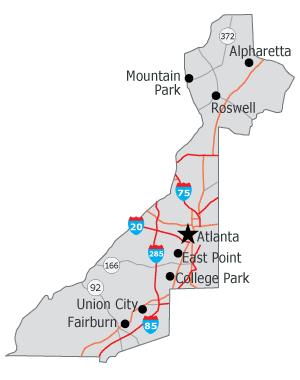Fulton County

Fulton County Injury Lawyer
Our statewide litigation of wrongful death and catastrophic cases throughout Georgia often takes us to the courts of Fulton County, where we are located.
Fulton County is the most populous of Georgia’s 159 counties and home of the state capitol, Atlanta. The population of Fulton County is just over 1 million out of almost 6.6 million in the 39-county Atlanta-Athens-Sandy Springs metropolitan area metropolitan statistical area.
Fulton County was founded in 1853, carved from a portion of DeKalb County, as the new town of Atlanta — founded as Terminus in railroad construction in 1837, incorporated as Marthasville in 1843 and renamed Atlanta in 1845. Many people assume it was named for Robert Fulton, inventor of the steamboat, but actually the county was named for Hamilton Fulton, who surveyed the route of the Western and Atlantic Railroad from Milledgeville to Chattanooga. By the time the Civil War arrived in 1861, Atlanta was a transportation and economic hub of the Southeast. Though in 1864 facilities of military significance were burned, with collateral damage to other property, Atlanta quickly rebuilt after the war. during the Great Depression, Fulton County annexed the solventcounties of Milton on the north and Campbell on the south.
A center of transportation (rail, highway and air) and commerce, Atlanta has been a perpetual boomtown throughout its history. Major freeways in Fulton County include I-85, I-75, I-20, I-285 and Georgia 400. The busiest civilian passenger airport in the world, Hartsfield-Jackson International Airport, straddles portions of Fulton and Clayton counties.
The courts in Atlanta includes the Supreme Court of Georgia, Court of Appeals of Georgia, United States Court of Appeals for the Eleventh Circuit, United States District Court for the Northern District of Georgia, United States Bankruptcy Court, Superior Court of Fulton County, State Court of Fulton County, Juvenile Court of Fulton County, Magistrate Court of Fulton County, and municipal courts of Atlanta (all located near each other in downtown Atlanta, and municipal courts of Sandy Springs, Roswell, Alpharetta, Johns Creek, College Park, East Point, Fairburn, Union City, Palmetto, Chattahoochee Hills and South Fulton.
Magistrate courts have civil jurisdiction over small claims up to $15,000. We do not handle traffic tickets, family law or small claims, and do not ordinarily go to Magistrate Courts or municipal courts unless it is to monitor a traffic court proceedings of someone who injured our clients.
As a major urban jurisdiction, Fulton County has seen some of the more significant jury verdicts in Georgia, though other counties have been catching up in that regard. Substantial civil cases are litigated in U.S. District Court, Superior Court and State Court. We regularly practice in all of these, in Fulton County and throughout Georgia, and handle appeals from those courts as needed.
The Atlanta Division of the U.S. District Court for the Northern District of Georgia has jurisdiction in civil cases with more than $75,000 in controversy in which all the parties on one side are domiciled in states different from all the parties on the other side. That is called “diversity of citizenship.” The court also has jurisdiction in a variety of other civil cases where Congress has provided for federal court jurisdiction. The Atlanta Division of the Northern District includes the counties of Fulton, Cherokee, Clayton, Cobb, DeKalb, Douglas, Gwinnett, Henry, Newton and Rockdale. Other divisions are based in Rome, Newnan and Gainesville. The district court is located in the Richard B. Russell Federal Building on Ted Turner Drive. Northern District Judges include Thomas W. Thrash (chief judge), Timothy C. Batten, Michael L. Brown, Mark H. Cohen, Clarence Cooper (senior judge), Orinda D. Evans (senior judge), Steve C. Jones, Leigh Martin May, Harold L. Murphy (senior judge), Charles A. Pannell, Jr. (senior judge), William M. Ray, II, Eleanor L. Ross, Richard W. Story (transition to senior status pending), and Amy Totenberg. The court utilizes e-filing through the federal MC/ECF system.
The Superior Court of Fulton County has general jurisdiction in all civil cases with venue in Fulton County, divorce cases, and felony criminal cases punishable by death or imprisonment for one year or more. Because of the heavy criminal and domestic relations dockets in Superior Court, many lawyers choose to go to State Court for civil cases that do not require equity jurisdiction, e.g., injunctions. The Judges of Fulton Superior Court include Robert C. McBurney (chief judge), John J. Goger (retirement pending), Gail S. Tusan, Constance C. Russell, Tom Campbell (senior judge), Ural Glanville, Craig L. Schwall, Christopher S. Brasher, Henry W. Newkirk, Kimberly M. Esmond Adams, Shawn Ellen LaGrua, Kelly Lee Elerbe, Todd Markle, Jane C. Barwick, Thomas A. Cox, Jr., Eric Dunaway, Belinda E. Edwards, Paige Reese Whitaker, Shukura Ingram Millender and Rebecca Crumrine Reider. Fulton Superior Court uses mandatory e-filing through Odyssey eFileGa.
The State Court of Fulton County has jurisdiction over all civil damages cases that do not require equity jurisdiction for injunctions, etc., and misdemeanor criminal cases. Most civil damage suits for serious personal injury and wrongful death are filed in State Court. The judges of State Court include Diane Bessen (chief judge), Patsy Porter, John Mather, Myra Dixon, Fred C. Eady, Susan E. Edlein, Jay M. Roth, Wesley B. Tailor, Jane Morrison and Eric A. Richardson. Fulton State Court utilizes mandatory e-filing through Odyssey eFileGa.












